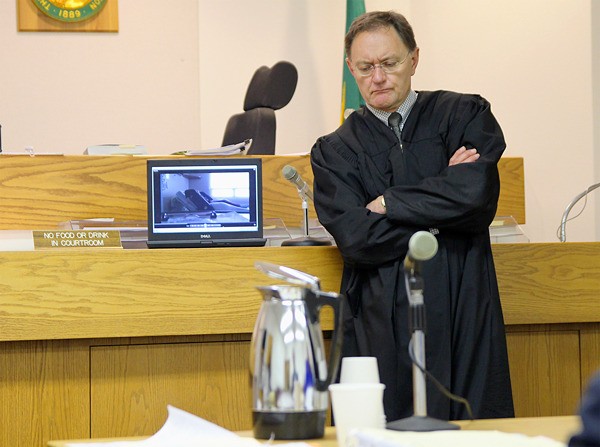The state Attorney General’s Office says that an Island County District Court judge committed “three fundamental errors of law” in awarding reimbursement of legal fees to a hospital administrator acquitted of assault.
Stephen Fairchild, an assistant attorney general, filed an opening brief in Island County Superior Court this week. It lays out the attorney general’s arguments for appealing the reimbursement decision.
The award was so excessive, the brief states, that it was “over five times the amount awarded in any other reported self-defense reimbursement case.”
Whidbey General Hospital Chief Nursing Officer Linda Gipson was acquitted during a trial in Island County District Court this summer of assaulting a restrained patient.
Following the verdict, District Court Judge Bill Hawkins ruled — over the prosecutor’s objection — that Gipson’s $250,000 in legal fees should be reimbursed through a special state fund for criminal defendants who are acquitted on the basis of self-defense.
Since Whidbey General Hospital paid for Gipson’s attorney fees, the hospital may be out $250,000 if the appeal is successful.
Gipson’s attorney, Andrew Schwarz of Seattle, previously emphasized that the appeal only concerns the narrow issue regarding the reimbursement and has nothing to do with his client’s acquittal; double-jeopardy rules prevent her from being tried again.
Fairchild argues in his opening brief, however, that Hawkins abused his discretion in failing to recuse himself and that the Superior Court “should reverse both the trial outcome and the award and remand for a new trial before a different District Judge.”
In response to a request to clarify the statement, a spokesperson for the Attorney General’s Office indicated that the office could not comment beyond what’s contained in the brief.
Schwarz did not respond to a request for comment on the brief.
In the brief, Fairchild argues that Hawkins should have disqualified himself from hearing the case because of the appearance of potential bias.
Fairchild wrote that Hawkins himself acknowledged that that his wife works for Gipson at the hospital, and that “would lead a reasonable observer to question” his impartiality, but he refused to disqualify himself.
The brief notes that Hawkins himself expressed uncertainly about whether it would be “appropriate for him to hear the case.”
In open court, Hawkins said his wife works under Gipson and they sometimes have conversations and work on the same committees. Hawkins said he didn’t know “if it would be appropriate” for him to hear the case, the brief states.
Based on Hawkins’ comment, the prosecutor moved for Hawkins to voluntarily disqualify himself.
Hawkins denied the motion, saying that his wife and Gipson “never worked in close proximity and rarely have contact.”
In court, Schwarz argued that it was not necessary for Hawkins to disqualify himself from hearing the case.
“A motion for recusal is a rarely made, extraordinary motion used only if there is strong evidence of bias or the appearance of bias in a judicial officer,” he wrote in an email to the Whidbey News-Times last month. “Such a motion is rarely made and even more rarely granted.”
Fairchild also argues that Gipson did not qualify for the reimbursement fund because she didn’t assert self defense, but that the jury found her actions were a lawful use of force in restraining a mentally ill person.
“The self-defense reimbursement statute’s language, structure, and history are crystal clear: The statute permits reimbursement only for self-defense, not lawful use of force generally,” the brief states.
Fairchild also argues that Hawkins erred by awarding Gipson attorney’s fees when she did not incur the costs, since the hospital picked up the bill.
Fairchild notes that Gipson would “receive a windfall at taxpayer expense” since the $250,000 reimbursement would go to her, not the hospital. Schwarz said Gipson intends to pass the money to the hospital, but the prosecutor argued that there was nothing to compelling her to do so.
In addition, Fairchild argues that the fee award was unreasonable, not only because it was excessive, but because Hawkins did not adequately examine the billing records.
The brief states some entries in the bill are not permitted under the “lodestar method,” for example, billing for the time to review news articles and take a telephone call from a Whidbey News-Times reporter.



